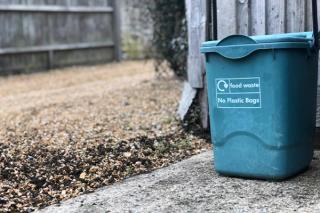
Food waste treatment - when and how should Local Authorities secure capacity?
- Post Date
- 10 March 2023
- Author
- Ian Manley
- Read Time
- 3 minutes

The requirement for Local Authorities (LAs) in England to provide separate food waste collections has been known to be on its way for almost three years. As a result all LAs will have been, or will soon need to evaluate how they will implement this change. This will involve assessing existing contractual and service delivery positions to understand what opportunities and scope exist to implement the changes. Where this does not exist, variations and new procurements will need to be initiated to establish collection services, purchase containers and liners, design communications and secure treatment outlets.
Current published figures show that ~500ktpa [1] of separate food waste from LAs was collected and processed in England during the financial year 20/21. The Resources and Waste Strategy has predicted that the implementation of weekly kerbside food waste collections could yield an increase of ~1.4 million tonnes of separated food waste by 2035[2]. This step change represents a significant shift in both the collection and treatment infrastructure required by LAs over the coming decade.
To add further context, it is estimated that currently only 35% [2] of LAs collect separate food waste, representing just under 6.9 million households of a total of 23.7million. This means that ~75% of all households in England [3] do not currently receive a separate food waste collection.
A range of established guidance and best practice already exists to support LAs but this will need to be tailored to each individual area. This is particularly true when it comes to securing or providing treatment capacity. It is likely to be an entirely new marketplace for many LAs having not procured similar services to support existing collection regimes. LAs will need to decide whether treatment capacity can be accessed via existing suppliers or whether alternative approaches offer more attractive solutions, including directly contracting with treatment providers or even considering the commissioning of LA owned facilities. Early market engagement and research is highly recommended to build an understating of the local and regional marketplaces which may already be able to provide solutions.
Collaboration opportunities to jointly procure services will also exist. Some smaller LAs are unlikely to produce yields of a scale to support a viable business case to develop facilities in their areas. In these instances, the economies of scale delivered by pooling multiple LA tonnages may leverage improved value and opportunity both individually and collectively.
There are likely to be enhanced benefits for LAs who plan well and approach this opportunity early seeking to realise the broad value that food waste treatment can provide by getting ahead of the game. This could involve securing capacity at existing facilities far in advance of frontline collections going live to avoid the rush. Dialogue with industry will also help LAs understand how they can maximise the benefit of supplying food waste. This could include opportunities for profit and risk share, alongside exploring decarbonisation opportunities to power ULEV fleets and other LA infrastructure.
What to procure, when to procure, and, how to procure future food waste treatment needs for LAs that achieves the best value for money is the challenge. If this article resonates with your current strategies and projects and you would like to find out more, please contact us.
References
[1]WFH_England_Data_202021.xlsx (live.com)
[2]Impact Assessment (defra.gov.uk)
[3] Food waste collections must be rolled out (theecologist.org)

